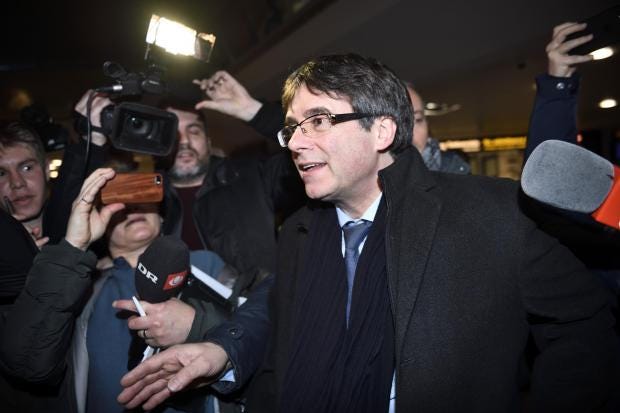
Catalan's former leader Carles Puigdemont has ended his candidacy for a second term as president, dealing a blow to the region's independence movement.
Announcing he was provisionally withdrawing his candidacy, he said that decision "is founded in one reason only - under current conditions it's the way to get a new government under way".
Catalonia has been ruled by Madrid since October, when Spanish Prime Minister Mariano Rajoy used constitutional powers to take over, after the region's parliament declared independence in the wake of a referendum.
Pro-secession parties won a majority in elections across Catalonia that Mr Rajoy called in December after sacking Mr Puigdemont and the rest of the region's government. Mr Puigdemont had campaigned to be re-instated as the region's leader.
Mr Puigdemont is in self-imposed exile in Belgium, as he faces charges of sedition and rebellion in Spain, and he fears arrest should he return to Spain. His supporters say he could govern remotely, but the Spanish government has rejected the notion of him governing from Brussels.
Mr Puigdemont said his party would propose a pro-secession campaigner, Jordi Sanchez - currently in remand in a Madrid prison on charges of sedition - as an alternative candidate. The nomination of Mr Sanchez is likely to be just as fraught with difficulty, given his circumstances. Mr Rajoy said that a Catalan leader “must be chosen now who is in Spain... and who has no problems with the law”.
Mr Puigdemont’s stepping aside came hours after the Catalan parliament voted to support him and his candidacy, and to reaffirm the result of the referendum.
The vote affirmed the parliament’s belief that Mr Puigdemont is the legitimate leader of Catalonia, and indicated that they believe it is important to form an effective government in the region.
“The honourable President Puigdemont has won enough support at the ballot box to be allowed to be voted in as president,” Quim Torra, a member of parliament, said.
But, the notice did not say how exactly the parliament might move forward to establishing a working government. Those efforts have been in a stalemate since at least December.
“This session has served to show there is no road map or resign for the future for the Catalan people,” Ines Arrimadas, the leader of the Ciudadanos party in Catalonia, said. That party won the election in December, but did not have enough seats to form a government at the time.







